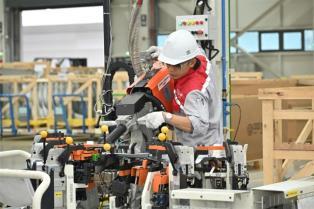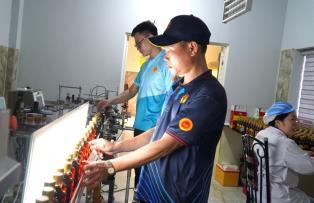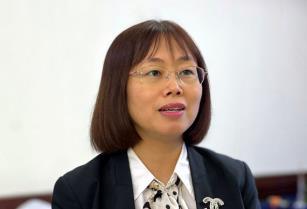Against the backdrop of Viet Nam’s push for a green and digital economy, Michele D’Ercole, chairman of the Italian Chamber of Commerce in Việt Nam, outlines how Italian technology and investment can support HCM City’s green transition and smart-city ambitions.

At the Autumn Economic Forum in HCM City, Michele D’Ercole, chairman of the Italian Chamber of Commerce in Việt Nam, highlighted Italy’s green transition experience and opportunities to boost collaboration with Việt Nam in renewable energy, smart cities, digital transformation and advanced technologies.
In the context of this year’s forum, themed Green Transition in the Digital Era, could you share some practical insights or lessons from Italy or from your organisation related to this topic?
This is an important and timely topic. In recent years, green transition has been widely discussed, but this year I can clearly see that the Vietnamese government is accelerating efforts to achieve this critical goal.
As the Italian Chamber of Commerce, we are very positive and proactive in promoting activities related to green transition and the green economy as well as areas connected to AI, semiconductors and biotechnology. We truly hope to support Việt Nam in realising these ambitious objectives in the years ahead. It will certainly not be easy, but we see a strong commitment and clear focus from the government.
Việt Nam is also undertaking provincial restructuring and administrative reforms, which will help reduce bureaucracy. Infrastructure development is being heavily pushed, creating a more favourable environment for companies – both domestic and foreign – wishing to invest in AI, smart city solutions and other advanced technologies.
HCM City aims to leverage science, technology and AI to shape a better future. From ICHAM’s perspective, how do you view the potential for collaboration, and how can ICHAM support HCM City and Vietnamese businesses in achieving these goals?
When local authorities create a positive and enabling environment, it becomes far easier to attract Italian companies to Việt Nam and encourage their participation in the country’s development priorities.
Italy is known globally not only for food, fashion and furniture but also for its strengths in smart city technologies. We possess advanced solutions for urban development and Italian enterprises can significantly contribute to smart city projects in HCM City.
Italy is also very strong in wastewater treatment technologies, which is an essential component of sustainable development. In addition, the semiconductor sector is another area where Italy can support Việt Nam; one of our major Italian semiconductor companies has a large regional hub in Singapore.
Many of the priorities mentioned by the Prime Minister align with Italy’s technological capabilities. Starting from 2026, ICHAM plans to organise seminars, conferences and business promotion programmes to attract more Italian companies, particularly those specialising in the fields Việt Nam aims to advance in the coming years.
How do you evaluate the current trade relationship between Việt Nam and Italy and is future potential?
Last year, Việt Nam and Italy recorded very positive results in bilateral trade. Looking ahead to 2026, we hope to further strengthen and expand this relationship. At present, Việt Nam’s exports to Italy are higher than Italy’s exports to Việt Nam. We would like to work towards a more balanced trade flow if possible, and we will continue supporting Italian companies in increasing their presence in the Vietnamese market.
The themes highlighted at this forum are new technologies, smart solutions, sustainability and green growth, which are fields in which Italy is particularly strong. We aim to help create a favourable environment for Italian companies to enter Việt Nam, share their expertise and offer their technologies to the Vietnamese market.
HCM City is developing into a high-tech centre, an international financial hub and a key manufacturing base. This diversified economic landscape provides numerous opportunities for Italian businesses to grow and expand their presence in southern Việt Nam. In my opinion, there will be substantial opportunities for Italian companies and technologies in the years ahead.
In your view, would an administrative merger of HCM City with Bà Rịa–Vũng Tàu and Bình Dương create a more attractive environment for investors?
Yes, I believe this merger can create additional business opportunities for Italian companies. Each of these localities offers different strengths, and together they provide access to a wider range of sectors than before. This integrated regional model can attract diversified investment and generate new prospects for cooperation.
Which areas of Italy’s strengths do you consider most relevant to Việt Nam and HCM City’s development priorities?
First of all, Italy can significantly support smart city development. We have extensive experience and strong expertise in this field, and further discussions with the HCM City authorities could help identify concrete areas of cooperation.
Secondly, wastewater treatment is a crucial issue for HCM City, particularly in canals and rivers. Italy has advanced technologies that could contribute effectively to this challenge.
Thirdly, green energy is another promising field. Both HCM City and Việt Nam are making progress in this area and Italy also has strong capabilities. To build a truly smart urban ecosystem, energy, transport and technology must be interconnected, and Italy is well positioned to support it.
Overall, these sectors present significant opportunities for collaboration and Italy can play an important role in supporting Việt Nam’s development in the coming years.
How do you assess Việt Nam’s investment climate for foreign enterprises?
The central and local governments are making considerable efforts to create favourable and predictable conditions for foreign investors. However, there is still room to streamline administrative procedures and accelerate processing times. In some cases, there are differences between central policies and local implementation, which can create challenges for businesses.
Local authorities should continue simplifying procedures and improving access for foreign companies. Enhancing digital government services, documentation processes and online administrative systems will also help attract more foreign investment.
As Việt Nam advances its digital government and digital economy, I believe its appeal to foreign investors will continue to grow. — VNS





